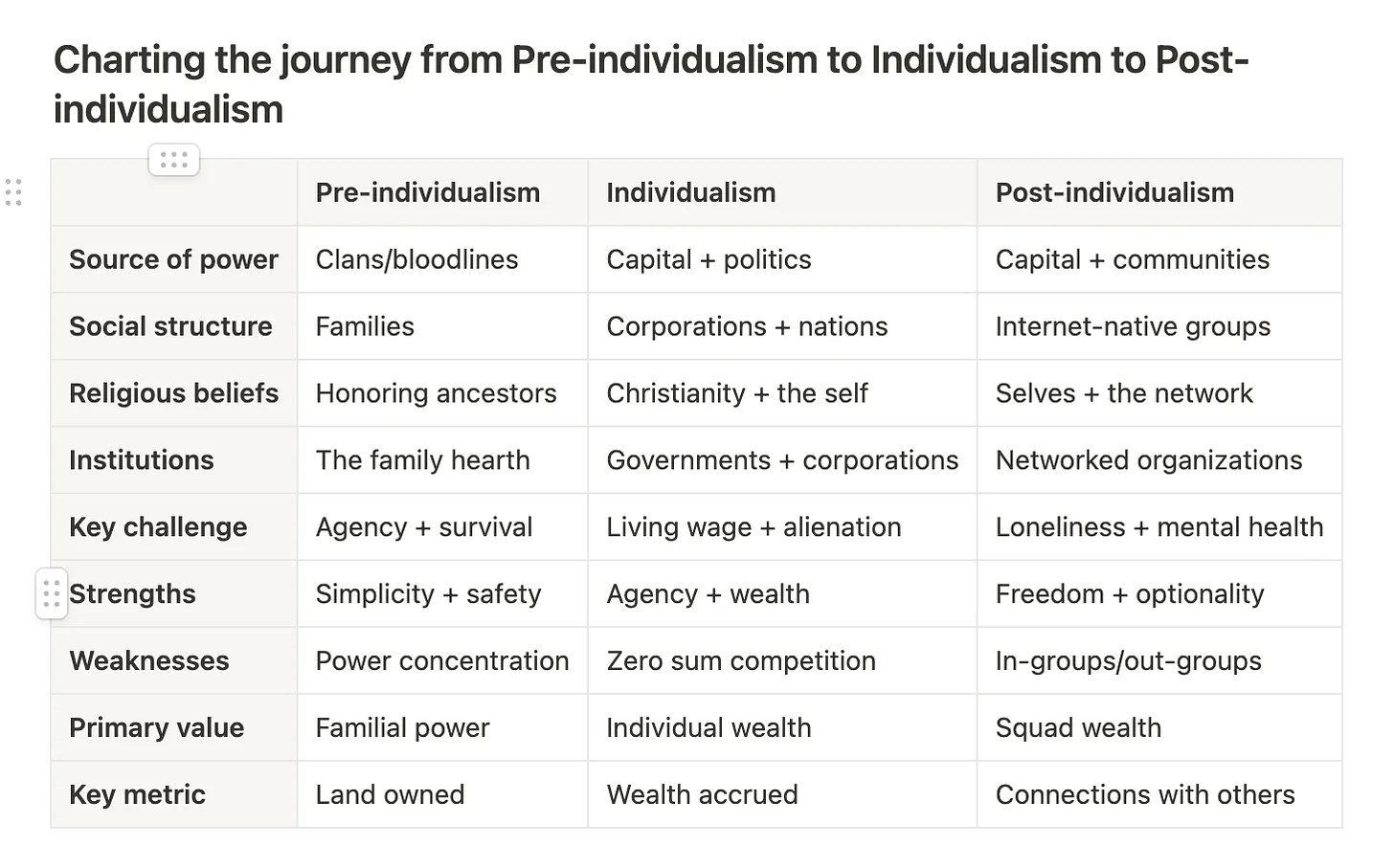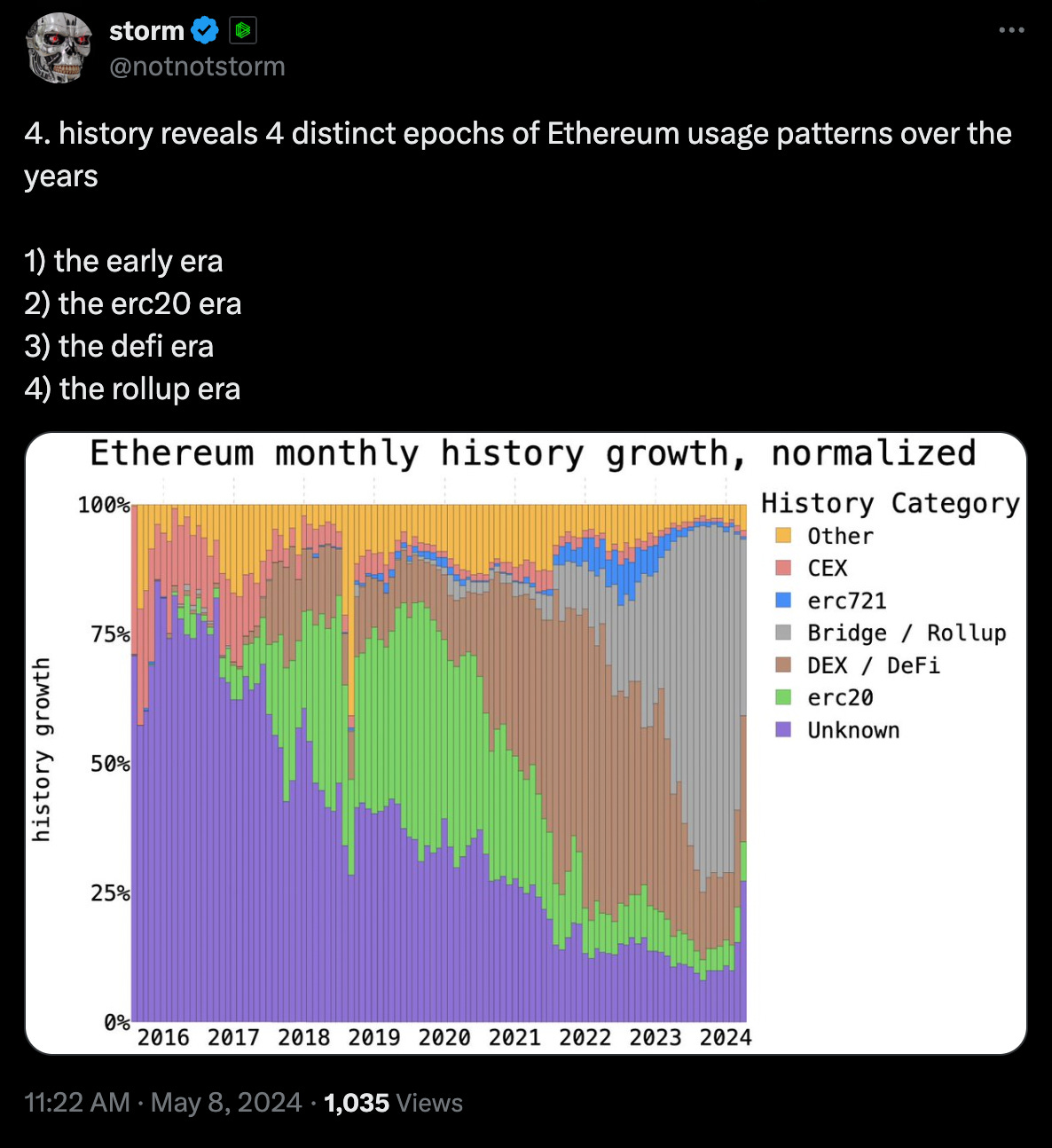The I in Will and Team in Testament
Also: More Book Publishing Stats, Ethereum Usage Graph, and Phantom Menace at 25
After moving countries and recently getting married, I finalised recent due diligence this week by updating my estate planning and personal affairs (including new wills and testaments). Not for any serious reason but just staying ahead of it. With each signature from a host of lawyers flying across various documents, it cemented an unexplained feeling of a loss of control. To me, it wasn’t the usual culprits that people might experience when setting up wills or estate planning: questions of mortality, existentialism, fairness, and justice. That felt normal.
Why did it then feel uncomfortable doing this? So I interrogated it through 3 lenses:
A Vantage Point Shift in Complexity
Mixing Different Agreement Systems
The Post-Individual Era

A Shift in Complexity
While, it’s all about me, and the “I”, I quickly re-adjusted my unease to recognize that adding this to my life was not really that different from the life I (and many) already lead. This extra set of documents felt like jumping into a world where there were no boundaries or end to it. That is what the law is, after all. Any contract. Any law. Any additional signature is really just a new probabilistic appendage of the nation state and our belief that the future is better if we all collectively strive to agree to these legal fictions. The pen I was using. The clothes I was wearing. The car I drove. The elevator that took me to a high floor. The building. The table. The paper. The ink. It all arrived at this moment because of stacks of existing legal fictions. It’s a constant process of negotiation and conversation between many individuals that hopefully result in an emergent pro-social benefit.
But, there’s so much of it.
An unfathomable excess of complexity. Even if you could manage to parse it all, there’s no there-there at the end of it. No conclusion or clarity. And while that might be hard to grasp, its essence is a conversation and that is a constant process. Thus, adding what happens to the things “I” own after I die is merely like tossing a raindrop into the ocean. I’ve always been a part of this whole and sometimes the “I” is an illusion. I only *really* have what I have through this meta-game of law and interpretation, law and interpretation.
A Clash of Agreement Systems
Even though blockchain systems source their certainty from what feels like there could be an end to it (you stop at the math), it’s still not 100% true. Blockchains don’t exist in a vacuum and still has to interface with the rest of the world. We use it as just another truthiness engine.
Alice Maz has an amazing article that speaks to how society has changed with the advent of different ways to capture information. This negotation, today, is ultimately a system of negotiation that was designed in the era of print.
It is customary to divide the history of communication into four periods: oral, manuscript, print, and electronic. Systems native to each period were in large part defined by the the means they provided to catalog and disseminate information. Writing enabled the development of institutions of knowledge unbound by the limits of memory and generational transmission, marking a shift from teaching and knowing to study and interpretation. Print allowed for texts to be distributed to the masses directly rather than dictated by an intermediary and enlisted their participation in the act of interpreting. The internet now is the means by which anyone may author and transmit their own texts unencumbered by previous physical constraints.
…and maybe that’s also where my unease comes from. I came of age where my digital and crypto primacy meant that at some point, I owned more crypto things that than legal nation-state things. Merging these two when you talk about estate planning remains incongruous. Unlike other legal nation-state things, you can transfer them through these concoctions of documents and wet signatures, but not crypto things. In that sense, even though it’s not true, a crypto-mediated world of agreements *felt* more certain (for good and bad) and I was stepping out of new world that was old to me into an old world that was new to me. How did it make sense that both print and wet signatures held the same primacy as a mathematically derived cryptographic signature?
The Post-Individual Era
If I would proffer a question that I would be okay with spending time working on for the rest of my life, it’s the question of: “Where do I end and you begin?” Inadvertently, this is a key theme in my first novel, and more deliberately in my second novel I’m writing right now.
Yancey Strickler’s new article on the post-individual gave some additional insight into my reaction. It goes through a short history of the individual’s rise in Western culture to what we have today: the internet allowing us to be many things.
Like content feed algorithms, the internet grants us the ability to segment our micro-personas into distinct identities that create and join communities with the micro-personas of others. On the internet our inner selves come alive to manifest parallel realities so powerful they’re overtaking the world that created them.
I’ve admittedly never indulged in creating any new identity that isn’t myself. No anon moniker. No other person. I’m just Simon. I think it comes from Yancey’s own perspective on this. Maintaining multiple identities is a struggle.
What I’ve come to realize is that while our potential identities are infinite, our energy is not. Energy put into one identity is energy taken from another. To be Very Online is to be Never Offline. To become infinite is to become infinitesimal somewhere else.
The web is a super-machine at coaxing us into moulds. I’ve always been super aware of potentially losing myself and merely becoming a caricature I feed to an audience. You see it in people that become successful and just start to crave more of it in the feeds and they eventually become defined by it: posting more and more generic viral bait to feel relevant. You become moulded by others.
Knowing this and how easily one can get sucked into the information-dopamine vortex, it’s also why I don’t want to make parallel monikers or go anon with an alt. An alt can be a release for an identity you want to experiment with, but that can lead to the same feedback loops. For example, when I was younger, I was naively a bit more of a misanthrope, and if I created an alt that indulged in this, I might have spiralled into becoming that person, fully. So, in me, is many selves, and so the “I” becomes even more blurry, as “I” also negotiate with all the selves I can and want to be.
I loved this idea from the article:
The activist and technologist Pia Mancini once told me about the emergence of a new word in Barcelona: yosotros— a combination of “I” (”yo”) and “We” (”nosotros”) that represents the collective I, the singular We. The term emerged through political movements, but its implications feel bigger. Could this represent a form of collective self? A new pronoun?
Despite me not really playing at distinctly creating separate identities, I still present different things in different contexts. On Twitter, I present differently to who I am in an obscure Discord server, which is different to who I am with family, or who I am in this newsletter, to you. We ultimately can be many more people even if we still present as the same person. In writing up a will and testament in the post-individual era means condensing *all* of us into one document: my marriage, my things, this newsletter, my family, my old lives, my lives I still hope to live, futures yet to come, and so forth. And maybe the freedom we’ve gained from being able to be many things and then being asked to condense it back into a legal document is where my unease stemmed from. But maybe that’s also where the answer comes from.
To see the collective I and the singular We. Yosotros. There’s an “I” in Will, but there’s also a “Team” in Testament.
Bonus Content!
In my 30’s, one other thing that I’ve been more cognizant and trying to learn is how to more actively incorporate rest and recovery into, well, everything. Much of life has diminishing returns and this week, I added a “deload” week into my running after pushing for 3 weeks straight. Last time I didn’t do this, I ended up getting injured. It’s been good to take some rest. It’s something I want to be more conscious. Maybe that might even be something I consider this newsletter. Every 4th week is a rest week? For now, I can still write every week, but life circumstances might change otherwise in the future.
Phantom Menace at 25 Years
Last Sunday I went to re-watch the Phantom Menace in cinema. I’m a huge Star Wars fan (having went to my first Celebration last year in London) and the love for it started with the Phantom Menace.
I still adore it 25 years later. A part of me realised that one of the main reasons it was still a fun film is that I was Anakin’s age when it came out. Seeing a young nerdy kid doing cool shit rekindled that boy in me. Then, as it is today, if you start a film containing space wizards, goofy amphibians, and pod racing with a galactic trade dispute, I’m all in. Get me a bucket of popcorn and I’ll watch every bit of it. I still think it’s George Lucas at his best: a world-builder.
People Buy Books
Just been really adoring all the commentary recently on the publishing industry. Just absorbing as much as I can. This one from Brooke Warner contains some great stats and insights on the US publishing industry!
Found it via Lincoln Michel, who is always excellent at surfacing all these links.
Revenge of the Home Page
I enjoyed this take from Kyle Chayka, talking about how some sites are taking back the idea of a homepage. Sites like The Verge or Semafor.
One welcome lesson of the post-platform Internet is that sticking to what you’re good at might be a better strategy in the long run than trying to make content that’s popular.
I think it fits the theme of rewilding the web. A home-page is a garden. I think the only sites I currently, regularly use as a source of information that isn’t explicitly social media is prediction markets.
Ethereum Usage Graph
I must say. With the recent era towards being a security layer for layer 2’s (rollups), I kind of lament the loss of the era where everything happened in one layer. It’s a necessary part of scaling and growth, but we’ll likely remember this first decade as one where it all happened in one proverbial “small room”.
Trent Reznor & Atticus Ross - I Know [Mixed by Boys Noize)
This week’s song that’s been on repeat is this mix from the film Challengers. I have not watched Challengers yet. I’m hoping to. Big fan of tennis and heard good things about the film! Regardless, it’s a banger of a track. Enjoy it!
That’s it for this week folks. Hope you get to enjoy a sunset.
Simon






